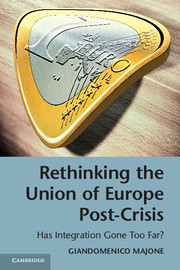Book contents
- Frontmatter
- Contents
- List of abbreviations
- Introduction: varieties of regional integration
- 1 Monetary union as a metaphor
- 2 A political culture of total optimism: its rise and fall
- 3 Integration and its modes
- 4 Deepening integration: transaction costs and socio-political limits
- 5 European integration and the decoupling of politics and economics
- 6 From the democratic deficit to a democratic default? The normative dimension of the euro crisis
- 7 ‘More Europe’
- 8 The limits of leaderless Europe
- 9 Integration through cooperative competition
- 10 The nation state between globalization and regional integration
- Bibliography
- Index
6 - From the democratic deficit to a democratic default? The normative dimension of the euro crisis
Published online by Cambridge University Press: 05 May 2014
- Frontmatter
- Contents
- List of abbreviations
- Introduction: varieties of regional integration
- 1 Monetary union as a metaphor
- 2 A political culture of total optimism: its rise and fall
- 3 Integration and its modes
- 4 Deepening integration: transaction costs and socio-political limits
- 5 European integration and the decoupling of politics and economics
- 6 From the democratic deficit to a democratic default? The normative dimension of the euro crisis
- 7 ‘More Europe’
- 8 The limits of leaderless Europe
- 9 Integration through cooperative competition
- 10 The nation state between globalization and regional integration
- Bibliography
- Index
Summary
The European Parliament: a formal solution to the EU’s legitimacy problems
No country can become a member of the EU unless it is recognized by the other member states as being a true representative democracy. The EU itself, however, is not a fully-fledged democracy: it suffers from a serious ‘democratic deficit’ – not a total absence but an incomplete development, or even a distortion, of the practices and institutions of representative democracy. For example, legislation can only be initiated by the non-elected European Commission. Hence the jocular paradox: if the EU were a state it could not become a member of the Union! Despite a vast body of literature trying to explain this paradox, and despite the important place the issue of the democratic deficit has occupied in public discourse for the last twenty or so years, few problems of European integration have been so consistently misunderstood, or deliberately misconstrued. I suggest that a correct understanding of the question must start from the realization that the problem of the insufficient democratic legitimacy of the European project only started to attract attention in the late 1980s, and became increasingly visible with the steady growth of European competences, culminating in monetary union.
The standard explanation of the limited democratic legitimacy of the EC/EU has been first the absence of a directly elected EP and then – after 1979 when direct European elections took place for the first time – the inadequate powers granted to the supranational parliament. As already noted in chapter 1, the powers of this body have been expanded treaty after treaty without, however, producing the hoped-for results. According to a knowledgeable student of the EP, the driving force in this expansion of parliamentary powers has been the power of the democratic idea. He writes: ‘Governments have found it extremely difficult to resist an increase in the role of the EP, because they have not easily been able to formulate an alternative for addressing the “democratic deficit”’ (Shackleton 2012: 145). In fact, it would be more correct to speak of the unwillingness, rather than inability, to formulate alternatives for tackling the question of insufficient democratic legitimacy.
- Type
- Chapter
- Information
- Rethinking the Union of Europe Post-CrisisHas Integration Gone Too Far?, pp. 179 - 207Publisher: Cambridge University PressPrint publication year: 2014
- 1
- Cited by



